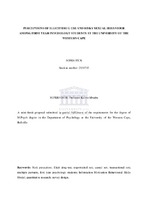Perceptions of illicit drug use and risky sexual behaviour among first year psychology students at the University of the Western Cape
Abstract
HIV poses considerable social and health challenges in South Africa, particularly among young people aged 15-24. Research indicates a strong link between risky sexual behaviour and alcohol and illicit drugs. In the Western Cape drug-related behaviours is a growing concern among young people because of relatively high prevalence rates of drug abuse, particularly methamphetamine. Previous South African studies have tended to focused on the link between substance use and risky sexual behaviour among commercial sex workers. The theoretical approach of this study is the information motivation behavioural skills model. Participants were selected using non-probability sampling of 279 first year students registered for Psychology I at the University of the Western Cape. This study employed a quantitative research approach using a survey design. Results: Forty-six percent of students do not believe that the use of illicit drugs has an impact on a person's sexual behavior. However, the findings also showed that only 45% of students believed that there was a difference between illicit drug users correctly using condoms when compared to non-users. Data was analysed using descriptive and inferential statistics. Conclusion: Prevention is our best and most effective means of decreasing risk-taking behaviours associated with HIV infection. Information is the first line of intervention that is necessary to reduce risk-taking behaviours; however prevention strategies and interventions of risk-taking behaviours should aim to increase motivation and help young people integrate information in a way that it is personally relatable. This is vital to address the inconsistencies between perceptions of risk and the realities of risk-taking behaviour.

